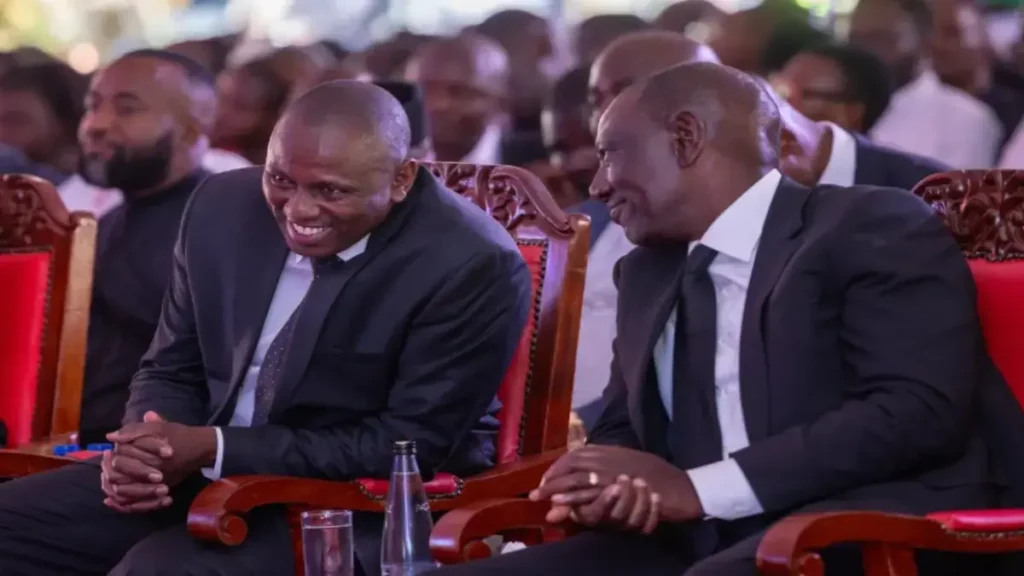Kenya’s political landscape has long been defined by loyalty to the president, with figures who exhibit unwavering allegiance often gaining significant influence. From Jomo Kenyatta’s era, where Daniel Arap Moi stood as a loyal defender of government policies, to the days of Moi’s own reign, loyalty has been a fundamental tool for both political survival and personal gain.

This tradition produced prominent figures like Kariuki Chotara and John Joseph “JJ” Kamotho, whose steadfast loyalty to Moi earned them powerful positions.
Today, National Assembly Majority Leader Kimani Ichung’wah appears to be following in their footsteps, aligning himself closely with President William Ruto’s leadership.
Chotara, a former farmer-turned-politician, rose through the political ranks as a fervent supporter of Moi’s government. Known for his sharp rhetoric and controversial methods, he fiercely defended Moi’s interests.
He even went as far as accusing fellow KANU officials of secretly plotting against Moi, a bold move that underscored his unyielding loyalty.
Similarly, JJ Kamotho’s loyalty to the ruling party made him a key figure in Moi’s administration. Kamotho’s iconic slogans like “KANU ni baba na mama” (KANU is our father and mother) reinforced his position as a trusted ally of the president.
His tenure in Parliament, along with several Cabinet appointments, demonstrated how loyalty could lead to political power in Kenya.
Fast forward to 2024, and Ichung’wah has emerged as one of Ruto’s most vocal supporters. Representing Kikuyu Constituency for a second term, he has aggressively defended the government’s stance on various issues.
In June 2024, during debates over the Finance Bill, Ichung’wah mocked youthful protestors, accusing them of ignorance. His comments, which included remarks about protestors using iPhones and dining at KFC, sparked public outrage, with many criticising him for being out of touch.
Despite the backlash, Ichung’wah adjusted his tone, later acknowledging the efforts of the younger generation in challenging tribalism in Kenyan politics.
This shift highlighted his ability to adapt to criticism, yet remain steadfast in his loyalty to Ruto.
Ichung’wah’s commitment to Ruto became even more evident in September when he clashed with former Deputy President Rigathi Gachagua over the politics of the Mount Kenya region.
Ichung’wah accused Gachagua of promoting divisive tribalism and called for greater unity within the region. His comments ignited speculation about a growing rift within Ruto’s camp, illustrating the delicate balance of loyalty and rivalry in Kenyan politics.
In addition, Ichung’wah confronted Trans Nzoia Governor George Natembeya, accusing him of human rights abuses during his time as Rift Valley Regional Commissioner.
Speaking at a funeral, Ichung’wah linked Natembeya to past government atrocities, including abductions and killings in Kerio Valley, further asserting his position as a fierce critic of perceived political adversaries. Despite these controversies, Ichung’wah’s loyalty to Ruto remains resolute.
Like Chotara and Kamotho before him, he has secured his place as one of the most vocal defenders of the presidency, unapologetically challenging critics and rivals.
His actions echo the political loyalty that has long shaped Kenya’s political scene, with figures like Ichung’wah continuing to wield influence as a result of their allegiance to the head of state.
In the evolving dynamics of Kenyan politics, Kimani Ichung’wah’s unwavering support for President Ruto underscores the enduring role loyalty plays in shaping political careers and securing prominence within the government.
His actions serve as a reminder of the power of loyalty in Kenya’s political environment, where allegiance to the president can be the key to long-lasting political influence.